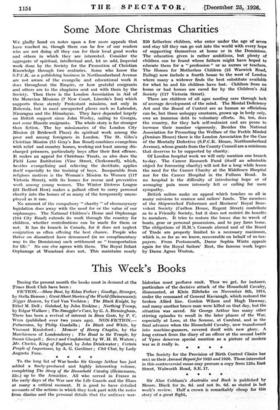Some More Christmas Charities
WE gladly hand on notes upon a few more appeals that have reached us, though there can be few of our readers who are not doing all they can for their local good works and others in which they are interested. Consider the aggregate of spiritual, intellectual and, let us add, Imperial work done by the Society for the Promotion of Christian Knowledge through two centuries. Some who know the S.P.C.K. as a publishing business in Northumberland Avenue are not aware of the evangelic and educational work it does throughout the Empire, or how grateful emigrants and others are to the chaplains sent out with them by the Society. Then there is the London Association in Aid of the Moravian Missions (7 New Court, Lincoln's Inn) which supports these sternly Protestant missions, not only in Bohemia, but in most unexpected places such as Labrador, Nicaragua and the Himalayas. They have depended largely on British support since John Wesley, sailing to Georgia, met some Hussite emigrants. The whole story is far stranger than fiction. The lay missionaries of the London City Mission (3 Bridewell Place) do spiritual work among the poor and among foreigners in London. The St. Giles's Christian Mission (15 Gray's Inn Road) combines evangelism with relief and country homes, working not least among dis- charged prisoners, particularly boys after their first offence. It makes an appeal for Christmas Treats, as also does the Field Lane Institution (Vine Street, Clerkenwell), which, besides evangelizing and relieving the destitute, applies itself especially to the training of boys. Inseparable from religious motives is the Woman's Mission to Women (117 Victoria Street), with its homes for rescue and preventive work among young women. The Winter Distress League (23 Bedford Row) makes a gallant effort to carry personal charity into the homes of as many of the temporarily unem- ployed as it can.
No amount of the compulsory " charity " of eleemosynary legislation does away with the need for or the value of our orphanages. The National Children's Home and Orphanage (104 City Road) extends its work through the country for children, whether contributions can be made for them or not. It has its branch in Canada, for it does not neglect emigration as often offering the best chance. People who thrive on discontent have denounced (in no complimentary way to the Dominions) such settlement as " transportation for life." No one else agrees with them. The Royal Infant Orphanage at Wanstead does not. This maintains nearly 250 fatherless children, who enter under the age of seven and stay till they can go out into the world with every hope of supporting themselves at home or in the Dominions. The education given is rather ambitious, but plenty of children can be found whose fathers might have hoped to educate them for a " profession" or as nurses or teachers. The Homes for Motherless Children (25 Warwick Road, Ealing) now include a fourth house to the west of London where many a widower finds the best substitute available for what he and his children have lost. Children from no home or bad homes are cared for by the Children's Aid Society (117 Victoria Street).
There are children of all ages needing care through lack of average development of the mind. The Mental Deficiency Act and the Board of Control are as human as officialism can be, but these unhappy creatures, grown up in body only, owe an immense debt to voluntary efforts. So, too, does the country, for they lack self-restraint and are prone to increase their number vigorously. Besides the National Association for Promoting the Welfare of the Feeble Minded (Denison House) there is the London Association for the Care of the Mentally Defective (S.P.C.K. House, Northumberland Avenue), whose grants from the County Council are a minimum that deserves to be supported by charity.
Of London hospital work we will only mention one branch to-day. The Cancer Research Fund (itself an admirable object for foreseeing charity) will not for a long while lessen the need for the Cancer Charity at the Middlesex Hospital nor for the Cancer Hospital in the Fulham Road. In no hospital is the difficulty of introducing hope or of assuaging pain more intensely felt or calling for more sympathy.
British sailors make an appeal which touches us all in many missions to seamen and sailors' funds. The members of the Shipwrecked Fishermen and Mariners' Royal Bene- volent Society (Carlton House, Regent Street) contribute as to a Friendly Society, but it does not restrict its benefits to members. It tries to restore the losses due to wreck of boats, gear or personal possessions, and to pay fares home. The obligations of H.M.'s Consuls abroad and of the Board of Trade are properly limited to a necessary maximum, which is, so far as we know, recoverable on behalf of us tax- payers. From Portsmouth, Dame Sophia Wintz appeals again for the Royal Sailors' Rest, the famous work begun by Dame Agnes Weston.


































 Previous page
Previous page